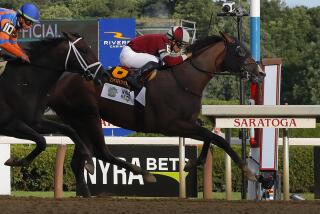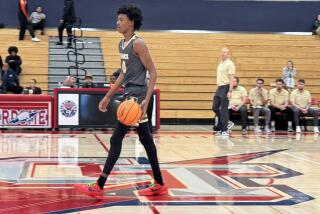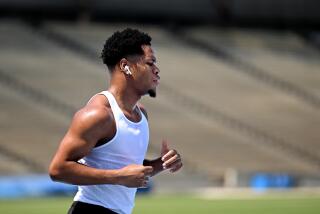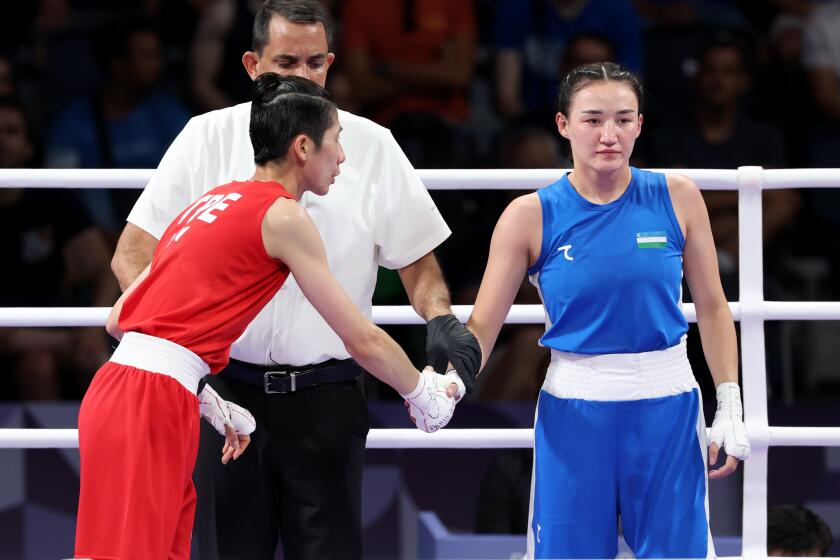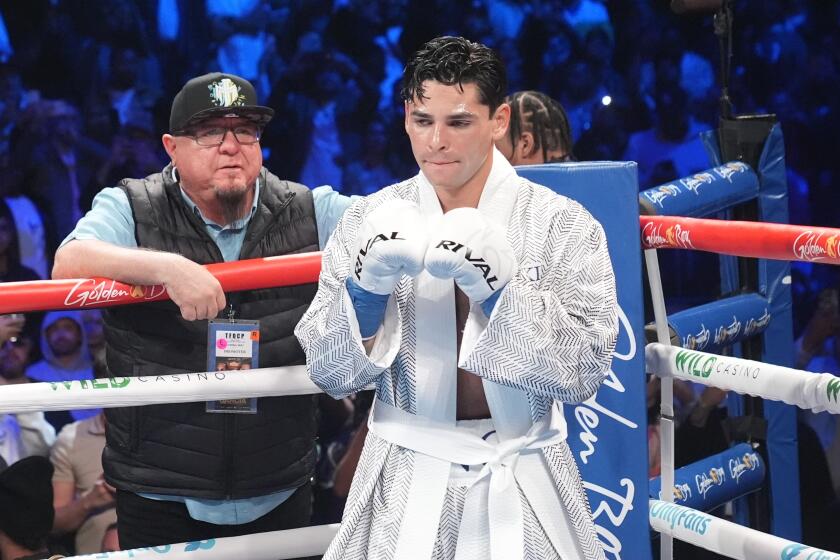Forrest Is the One Who Stands Taller
INDIANAPOLIS — No revenge, no redemption. No triumphant celebration in the ring, no victory party.
Not enough hurtful punches, not enough tiring flurries of combinations, not enough counterattacking, not enough answers for a man who is better.
And no excuses. Please, no excuses.
Shane Mosley, an energetic mover at the first and a wistful thinker at the last, lost to Vernon Forrest in a World Boxing Council welterweight championship fight. Again.
For the second time in six months. For the same reasons. Because Mosley couldn’t duck under enough punches. Because Mosley couldn’t find his way inside to hurt the taller, lankier and steadier Forrest.
“The Rematch of the Century” was more of the same old, same old.
Mosley, 30, a thoughtful man from Pomona, a proud boxer who always has felt underappreciated even when he stunned the boxing world by beating Oscar De La Hoya at Staples Center, is not as good as Forrest.
In 40 professional fights, Mosley has lost twice. Both times to Forrest.
When the fight was over, before the unanimous decision was announced, Mosley was hoisted onto the shoulders of his father and coach, Jack. Mosley raised his arms high, as if to proclaim himself the winner, as if to pretend that by acting as the winner, it would be so.
And afterward, Mosley came to an interview room. He was smiling. He was unmarked. He seemed unhurt by any of Forrest’s punches. Forrest had a swollen cheek under his right eye. Forrest had been touched by a flurry of Mosley’s punches in the ninth round. Not hurt enough in what had begun at a furious pace but had finished in a languorous, sleepy rhythm.
It was the rhythm Forrest preferred and which Mosley settled into.
Mosley seemed surprised he didn’t receive extra credit for coming out fast and aggressive. Mosley went at Forrest in the first minute of the 12-round fight. Mosley was wound tight and throwing punches here, there and everywhere. He jumped back and forth, bobbed, weaved, stutter-stepped, danced, wiggled and waggled. Activity disguised as action.
More amused than worried, Forrest waited.
“I didn’t think it would keep up,” Forrest said. “And it didn’t. Pretty soon things settled down into my way.”
It was an uncomfortable fight with more holding than punching and more booing than cheering. It was as if the boxers knew they didn’t belong.
Entertainment? A hearty brawl in the stands between two men and two women brought the crowd of 15,775 to its feet. That was something Forrest and Mosley couldn’t do. The fans turned their backs on the ring and roared with approval as five security officials were needed to eject one writhing and struggling man.
Then they turned back and booed Mosley and Forrest, who were hugging each other. Is hugging a tactic? Do the judges count the number of hugs? It seemed they must as often as Mosley and Forrest clinched.
There had been much made this week by Mosley’s camp about a head butt by Forrest during their last bout at Madison Square Garden. The accusation was that Forrest planned to use his head as a weapon.
“No head butts this time,” Forrest’s trainer, Ronnie Fields, said. “No low blows, no controversy. What excuse can they use this time?”
Jack Mosley tried to make a tepid case that the scoring wasn’t fair, that his son wasn’t given credit for his activity.
“It was ludicrous [the unanimous decision],” Jack Mosley said. “If anything, this could have been a draw. The champion would still have kept his belt. But at least give Shane that, a draw.”
Those are the words of surrender. A father, a coach, a trainer, begging for a face-saving draw so that Forrest could keep his belt and his son could, what, keep his pride?
Someone asked Mosley if he’d like a third fight with Forrest. If the people want it, Mosley said.
The people won’t want it. They’ve had it twice. A winner has been declared. Forrest is a better welterweight than Mosley. Forrest is already talking of moving on, of possibly fighting De La Hoya.
“A lot of people thought this fight was a draw,” Mosley said. “Or maybe that I edged it out. And, no, I don’t feel he’s better than me. I guess the judges saw him as better than me. But only in the judges’ eyes.”
In more eyes than that. This rivalry is over. It is no more. As Forrest said, “Next.”
*
Diane Pucin can be reached at her e-mail address: [email protected].
More to Read
Go beyond the scoreboard
Get the latest on L.A.'s teams in the daily Sports Report newsletter.
You may occasionally receive promotional content from the Los Angeles Times.
